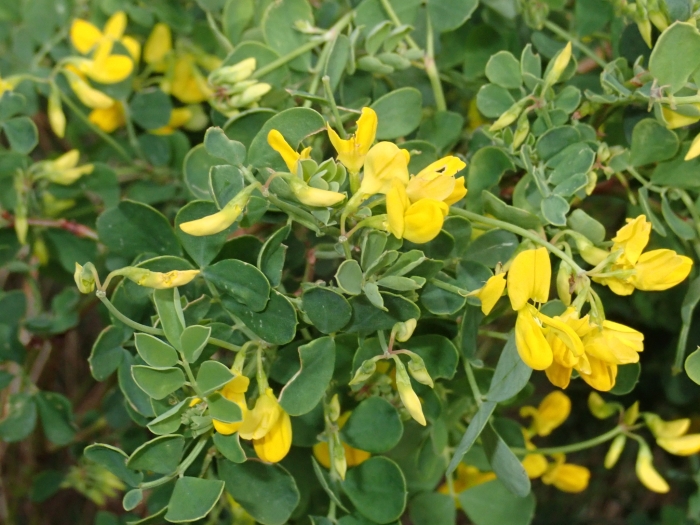Crownvetch
(Coronilla glauca)
Crownvetch (Coronilla glauca)
/
/

© Julien Renoult
CC BY 4.0
Image By:
© Julien Renoult
Recorded By:
Copyright:
CC BY 4.0
Copyright Notice:
Photo by: © Julien Renoult | License Type: CC BY 4.0 | License URL: http://creativecommons.org/licenses/by/4.0/ | Uploader: jujurenoult | Publisher: iNaturalist |

















Estimated Native Range
Summary
Coronilla glauca, commonly known as Crownvetch, is an evergreen shrub native to the Mediterranean region, particularly coastal and sub-coastal areas. It typically grows to 80 cm (31 in) tall and wide, featuring glaucous, pea-like foliage and clusters of fragrant, brilliant yellow flowers that bloom in spring and summer. The flowers are notably more fragrant during the daytime and become almost scentless at night. After flowering, it produces slender, elongated seed pods. Crownvetch is valued for its fragrant blossoms and its ability to thrive in Mediterranean-like conditions, offering a prolonged flowering season and evergreen foliage for year-round interest.
Crownvetch is well-suited for use in rock gardens, coastal gardens, and as a low hedge or ground cover in warm, sunny locations. It has gained recognition with the Royal Horticultural Society’s Award of Garden Merit, particularly the subspecies C. valentina subsp. glauca and its cultivar ’Citrina’. This shrub prefers full sun exposure and can tolerate drought conditions once established, requiring low amounts of water and well-drained soils. While it is fairly hardy, it benefits from shelter and warm sunshine. Gardeners should be cautious as Coronilla glauca can become invasive outside its native range, and it is advisable to check local regulations before planting.CC BY-SA 4.0
Crownvetch is well-suited for use in rock gardens, coastal gardens, and as a low hedge or ground cover in warm, sunny locations. It has gained recognition with the Royal Horticultural Society’s Award of Garden Merit, particularly the subspecies C. valentina subsp. glauca and its cultivar ’Citrina’. This shrub prefers full sun exposure and can tolerate drought conditions once established, requiring low amounts of water and well-drained soils. While it is fairly hardy, it benefits from shelter and warm sunshine. Gardeners should be cautious as Coronilla glauca can become invasive outside its native range, and it is advisable to check local regulations before planting.CC BY-SA 4.0
Plant Description
- Plant Type: Shrub
- Height: 2-3 feet
- Width: 2-3 feet
- Growth Rate: Moderate
- Flower Color: Yellow
- Flowering Season: Spring, Winter
- Leaf Retention: Evergreen
Growth Requirements
- Sun: Full Sun
- Water: Low
- Drainage: Medium
Common Uses
Drought Tolerant, Erosion Control, Fragrant, Groundcover, Low Maintenance, Rock Garden, Salt Tolerant, Showy Flowers
Natural Habitat
Native to the Mediterranean region, particularly coastal and sub-coastal areas
Other Names
Common Names: Mediterranean Crownvetch, Coronil, La Glauca
Scientific Names: , Coronilla glauca, Coronilla valentina subsp. glauca, Coronilla pentaphylloides, Coronilla argentea, Coronilla valentina var. zaianica, Coronilla glauca var. pentaphylloides, Coronilla hispanica, Coronilla glauca subsp. pentaphylloides, Coronilla glauca var. acaulis
GBIF Accepted Name: Coronilla valentina subsp. glauca (L.) Batt.